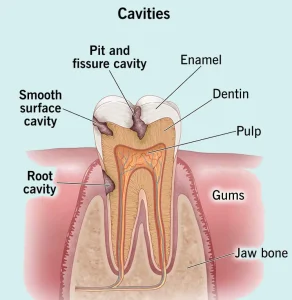Overview
Cavities, also known as dental caries or tooth decay, are permanent damage to the teeth that develop into tiny openings or holes. They occur when tooth enamel is eroded by acids produced by bacteria in the mouth. Cavities are one of the most common dental problems and can affect people of all ages. If left untreated, cavities can progress to deeper layers of the tooth, causing pain, infection, and even tooth loss.
Symptoms
Symptoms of cavities vary depending on the stage of tooth decay. Early cavities may not cause noticeable discomfort, while advanced decay can be painful.
Common symptoms include:
-
Toothache or spontaneous pain without an obvious cause
-
Sensitivity to hot, cold, or sweet foods and drinks
-
Visible pits or holes in teeth
-
Staining on the surface of the tooth (white, brown, or black spots)
In severe cases, symptoms may include:
-
Pain when biting or chewing
-
Swelling or pus around the affected tooth
-
Bad breath or unpleasant taste in the mouth
Causes
Cavities are caused by the interaction of bacteria, food, and the tooth surface. Acid produced by bacteria gradually erodes the enamel and dentin layers of the tooth.
Major causes include:
-
Poor oral hygiene
-
Frequent consumption of sugary or acidic foods and drinks
-
Plaque buildup on teeth
-
Dry mouth or reduced saliva production
-
Bacterial infection, particularly Streptococcus mutans
Risk Factors
Certain factors increase the likelihood of developing cavities.
Key risk factors include:
-
Inadequate brushing and flossing
-
High sugar diet
-
Smoking or tobacco use
-
Lack of fluoride exposure
-
Age, with children and older adults at higher risk
-
Medical conditions that reduce saliva flow
Complications
If left untreated, cavities can lead to serious dental and systemic problems.
Potential complications include:
-
Tooth abscess or infection
-
Severe toothache and sensitivity
-
Tooth loss
-
Spread of infection to surrounding tissues
-
Difficulty chewing or eating
-
Increased risk of other oral health problems
Prevention
Cavities can be largely prevented through proper oral hygiene and lifestyle measures.
Preventive strategies include:
-
Brushing teeth at least twice a day with fluoride toothpaste
-
Flossing daily to remove plaque between teeth
-
Reducing sugary and acidic foods and drinks
-
Regular dental check-ups and professional cleanings
-
Using dental sealants and fluoride treatments when recommended
-
Maintaining adequate hydration to support saliva production
Consistent preventive care helps protect teeth from decay and preserves overall oral health.
Advertisement

